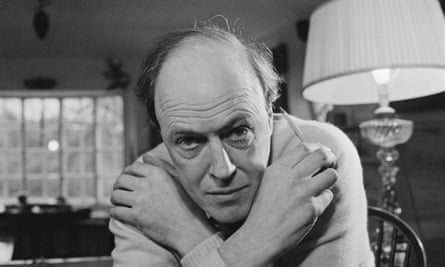Roald Dahl museum acknowledges author’s antisemitism | Roald Dahl
The Roald Dahl museum has acknowledged the author’s antisemitism in a statement published on its website and to be displayed on a panel at its entrance.
Dahl’s racism was “undeniable and indelible”, the museum in Great Missenden, Buckinghamshire, said. Its statement comes more than two and a half years after Dahl’s family apologised for his antisemitism.
The statement from the museum, which is a charity, said Dahl was a “contradictory person”. There were “recorded incidents of him being very unkind and worse, including writing and saying antisemitic things about Jewish people”.
It condemned “all racism directed at any group or individual … Antisemitism is a certain perception of Jews, which may be expressed as hatred toward Jews”.
The charity was “working to be more welcoming to all who might wish to visit in person or online”, it said. Since 2021 it had engaged with Jewish organisations, including the Board of Deputies of British Jews, the Jewish Leadership Council, the Community Security Trust and the Antisemitism Policy Trust. The latter had given training to staff.
It was developing teaching resources for schools that seek “to combat prejudice by championing universal children’s rights, explored through the experiences of characters in Roald Dahl’s stories”.
The charity said it was not repeating Dahl’s antisemitic statements publicly, “but we do keep a record of what he wrote and said in the museum’s collection, so it is not forgotten”.
It added: “Roald Dahl’s racism is undeniable and indelible but what we hope can also endure is the potential of Dahl’s creative legacy to do some good.”
Dahl’s books – including Charlie and the Chocolate Factory, Matilda and The BFG – have entranced children since the 1960s. The author died in 1990.
In an interview with the New Statesman in 1983, he said: “There is a trait in the Jewish character that does provoke animosity, maybe it’s a kind of lack of generosity towards non-Jews. I mean, there’s always a reason why anti-anything crops up anywhere.”
He added: “Even a stinker like Hitler didn’t just pick on them for no reason.”
after newsletter promotion
Five years ago, the Royal Mint dropped plans to celebrate Dahl’s life with a commemorative coin because of concerns about his antisemitic views. Official papers obtained by the Guardian disclosed that the Royal Mint concluded he was “not regarded as an author of the highest reputation”.
Earlier this year, it emerged that Dahl’s publisher Puffin had hired sensitivity readers to rewrite chunks of the author’s text to remove language deemed offensive.
Dahl’s first children’s book, The Gremlins, was published in 1943, followed by James and the Giant Peach in 1961, Charlie and the Chocolate Factory in 1964 and Fantastic Mr Fox in 1970.
He also co-wrote screenplays for the James Bond movie You Only Live Twice and Chitty Chitty Bang Bang, as well as writing adult novels.
The Roald Dahl museum has acknowledged the author’s antisemitism in a statement published on its website and to be displayed on a panel at its entrance.
Dahl’s racism was “undeniable and indelible”, the museum in Great Missenden, Buckinghamshire, said. Its statement comes more than two and a half years after Dahl’s family apologised for his antisemitism.
The statement from the museum, which is a charity, said Dahl was a “contradictory person”. There were “recorded incidents of him being very unkind and worse, including writing and saying antisemitic things about Jewish people”.
It condemned “all racism directed at any group or individual … Antisemitism is a certain perception of Jews, which may be expressed as hatred toward Jews”.
The charity was “working to be more welcoming to all who might wish to visit in person or online”, it said. Since 2021 it had engaged with Jewish organisations, including the Board of Deputies of British Jews, the Jewish Leadership Council, the Community Security Trust and the Antisemitism Policy Trust. The latter had given training to staff.
It was developing teaching resources for schools that seek “to combat prejudice by championing universal children’s rights, explored through the experiences of characters in Roald Dahl’s stories”.
The charity said it was not repeating Dahl’s antisemitic statements publicly, “but we do keep a record of what he wrote and said in the museum’s collection, so it is not forgotten”.
It added: “Roald Dahl’s racism is undeniable and indelible but what we hope can also endure is the potential of Dahl’s creative legacy to do some good.”

Dahl’s books – including Charlie and the Chocolate Factory, Matilda and The BFG – have entranced children since the 1960s. The author died in 1990.
In an interview with the New Statesman in 1983, he said: “There is a trait in the Jewish character that does provoke animosity, maybe it’s a kind of lack of generosity towards non-Jews. I mean, there’s always a reason why anti-anything crops up anywhere.”
He added: “Even a stinker like Hitler didn’t just pick on them for no reason.”
after newsletter promotion
Five years ago, the Royal Mint dropped plans to celebrate Dahl’s life with a commemorative coin because of concerns about his antisemitic views. Official papers obtained by the Guardian disclosed that the Royal Mint concluded he was “not regarded as an author of the highest reputation”.
Earlier this year, it emerged that Dahl’s publisher Puffin had hired sensitivity readers to rewrite chunks of the author’s text to remove language deemed offensive.
Dahl’s first children’s book, The Gremlins, was published in 1943, followed by James and the Giant Peach in 1961, Charlie and the Chocolate Factory in 1964 and Fantastic Mr Fox in 1970.
He also co-wrote screenplays for the James Bond movie You Only Live Twice and Chitty Chitty Bang Bang, as well as writing adult novels.
